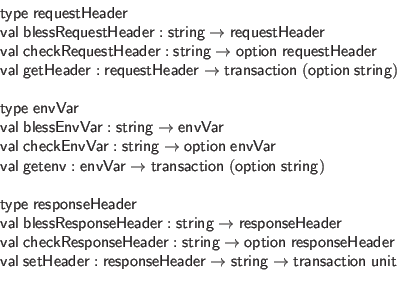There are transactions for reading an HTTP header by name and for getting and setting strongly typed cookies. Cookies may only be created by the
![]() declaration form, ensuring that they be named consistently based on module structure. For now, cookie operations are server-side only.
declaration form, ensuring that they be named consistently based on module structure. For now, cookie operations are server-side only.

There are also an abstract
![]() type and functions for converting to it, based on the policy defined by [allow|deny] url directives in the project file.
type and functions for converting to it, based on the policy defined by [allow|deny] url directives in the project file.

It is possible to grab the current page's URL or to build a URL for an arbitrary transaction that would also be an acceptable value of a link attribute of the a tag. These are server-side operations.

Page generation may be interrupted at any time with a request to redirect to a particular URL instead.
It's possible for pages to return files of arbitrary MIME types. A file can be input from the user using this data type, along with the
![]() form tag. These functions and those described in the following paragraph are server-side.
form tag. These functions and those described in the following paragraph are server-side.

It is also possible to get HTTP request headers and environment variables, and set HTTP response headers, using abstract types similar to the one for URLs.

A blob can be extracted from a file and returned as the page result. There are bless and check functions for MIME types analogous to those for URLs.
